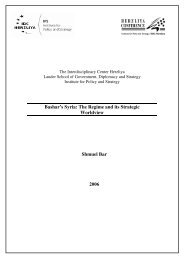Iran: Cultural Values, Self images and Negotiation Behavior
Iran: Cultural Values, Self images and Negotiation Behavior
Iran: Cultural Values, Self images and Negotiation Behavior
Create successful ePaper yourself
Turn your PDF publications into a flip-book with our unique Google optimized e-Paper software.
Abstractrealism – a predilection towards “playing by ear” <strong>and</strong> keeping options open with <strong>and</strong>ability to juggle options <strong>and</strong> keep them all in the air. Many of these traits arepopularly associated with the stereotype of the bazaar merchant (bazaari). On theother h<strong>and</strong>, the popular bazaari stereotype is replete with negative characteristics. Heis seen as a wheeler-dealer, one capable of selling ice to the Eskimos. He prefersshort-term profit to long-term advantages <strong>and</strong> confidence building; he is calculating,greedy, opportunistic, double-faced, dishonest, <strong>and</strong> manipulative <strong>and</strong> easily takesbribes (aptly called pour-cent or raant in modern <strong>Iran</strong>ian Persian). <strong>Self</strong>-critical<strong>Iran</strong>ians tend to ascribe these traits as well to “national characteristics”.At the same time, <strong>Iran</strong>ian society is, at its roots, religious with widespreadacceptance of popular superstition. <strong>Iran</strong>ians today tend to characterize themselves ashighly spiritual (rohani), in contrast to the materialistic West <strong>and</strong> Arab world. <strong>Iran</strong>ian“Reformists” are not secular, <strong>and</strong> do not call for a total separation of religion <strong>and</strong>State. Even the Shah – despite the present regime’s propag<strong>and</strong>a – was a believingShiite Muslim. This popular religiosity, however, st<strong>and</strong>s in stark contrast to the lowesteem in which <strong>Iran</strong>ians hold their clergy <strong>and</strong> the extremely negative Persianstereotypes of the Mullah as corrupt, hypocritical, avaricious, lascivious,argumentative, <strong>and</strong> unscrupulous – a person who exploits religion for the sake of hisown interests. These stereotypes are ingrained in <strong>Iran</strong>ian lore for centuries <strong>and</strong> are notthe consequence of disenchantment from the present regime.Both the “bazaar ethos” <strong>and</strong> the Shiite religious narrative of an oppressedminority are called upon to justify pragmatism. Shiite Islam provides defensemechanisms for survival: passive acceptance of political situations, dissimulation(ketman, taqiya) regarding their religious identity in order to stave off oppression,religious <strong>and</strong> cultural syncretism, <strong>and</strong> allowing for the absorption of non-indigenouspractice, <strong>and</strong> – most important – ijtihad, the right of senior scholars to makeinnovative strategic religious decisions based on their own interpretation of the Koran,<strong>and</strong> not on legal precedent alone (as in Sunnite Islam). Consequently, heroic suicidaldogmatism is not a characteristic of <strong>Iran</strong>ian political culture. <strong>Iran</strong>, as a nation, hasresponded to most threats in a pragmatic way, railing against the lack of justice in theway that stronger powers take advantage of their superior strength, but reactingaccording to a sober reading of the situation.<strong>Iran</strong>ian negotiation techniques reflect many of the cultural traits noted above.<strong>Iran</strong>ian negotiators are methodical <strong>and</strong> have demonstrated a high level of preparations<strong>and</strong> a detailed <strong>and</strong> legalistic attitude. On the other h<strong>and</strong>, their communication tends tobe extremely high-context; ambiguous, allusive <strong>and</strong> indirect not only in the choiceof words utilized, but in the dependence of the interpretation of the message on thecontext in which it is transmitted: non-verbal clues, staging <strong>and</strong> setting of the act ofcommunication, <strong>and</strong> the choice of the bearer of the message. Procrastination isanother key characteristic of <strong>Iran</strong>ian negotiation techniques. This st<strong>and</strong>s in sharpcontrast to American style communication (Get to the point/Where's the beef?/ time ismoney!) which places a high value on using lowest common denominator language inorder to ensure maximum <strong>and</strong> effective mutual underst<strong>and</strong>ing of the respective intentsof both sides. This tendency has been explained by an aversion to an assumption thatthe longer the negotiations last, the greater a chance that things can change in hisfavor <strong>and</strong> an intrinsic Shiite belief in the virtue of patience.iii
















